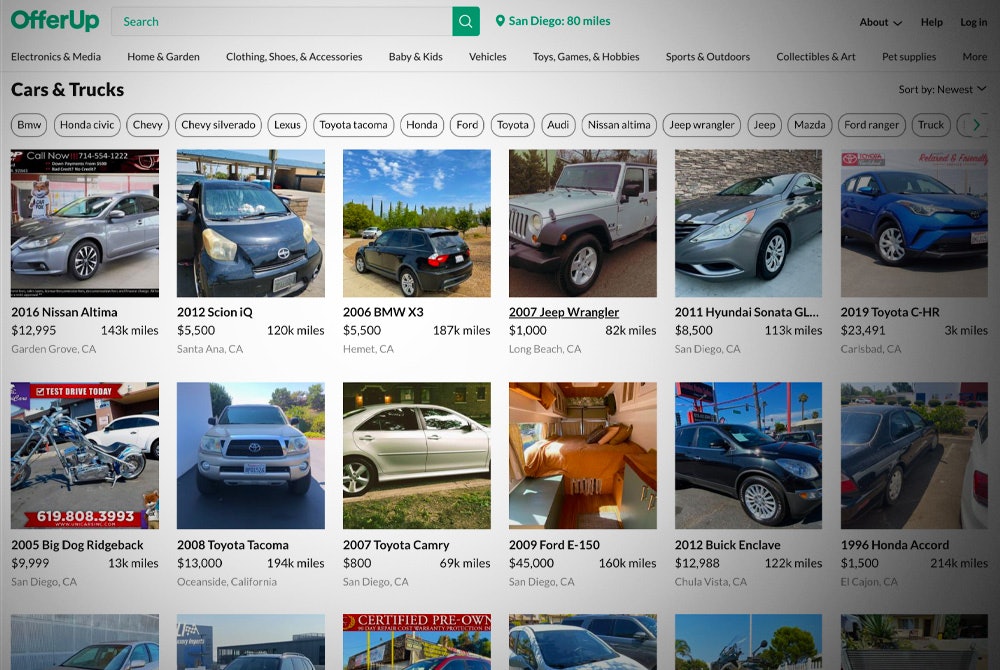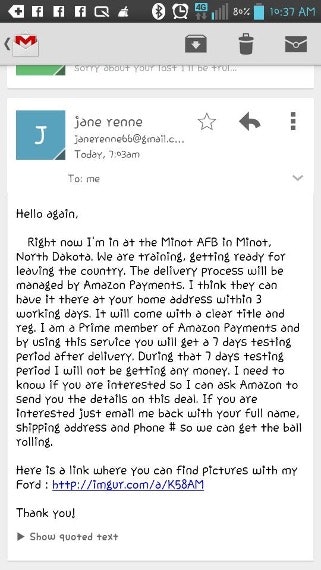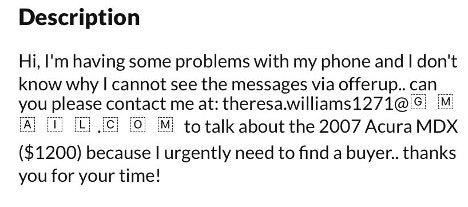- Types Of OfferUp Car Scams
- How To Beat and Avoid OfferUp Car Scams
- Red Flags of OfferUp Car Scams
- Examples of OfferUp Car Scams
- What to Do if You’ve Fallen for OfferUp Car Scams
- Frequently Asked Questions
In recent years, OfferUp has become one of the most popular online marketplaces to buy and sell used cars. Unfortunately, it’s also attracted its fair share of scammers who prey on OfferUp users interested in these big-ticket items. Falling victim to OfferUp car scams can be very expensive, leaving you out of thousands of dollars and without the vehicle you believed you were purchasing.
Types Of OfferUp Car Scams
Since OfferUp car scams can come in several different forms, here are the most popular versions to look out for.
Fake Title
After purchasing a vehicle on OfferUp, you unknowingly receive a fake title and a key for the car. The seller places a GPS tracker in the car and steals the vehicle back within hours to post it for sale again on OfferUp.
VIN Cloning
A car thief trying to sell a stolen car takes a picture of a similar-looking vehicle in the same year/model and uses that vehicle identification number (VIN) for the stolen vehicle. They can also steal the VIN from any cars that have been listed online for sale.
You won’t know the car is stolen when you get a vehicle history report because you’re looking up the wrong VIN.
The scammer duplicates the VIN plate and attaches it to the stolen car. Once the DMV notices the vehicle has been stolen, they will impound it.
Cars Don’t Exist
Scammers post ads for cars they don’t own, attempting to trick you with legitimate-looking photos and offering to answer your questions. They may even indicate that your purchase is protected through a site like eBay, which is outside of the OfferUp website.
In this version of an OfferUp car scam, the scammer will explain why they can’t show you the car in person. Instead, they may offer to ship it to you once you pay. The seller (i.e., scammer) disappears after you pay for the car, leaving you without the car and your money.
Gift Cards and Other Strange Payment Methods
Scammers ask you to pay for the car you found on OfferUp using gift cards, bitcoin, or wire transfer. Once you make the payment or provide gift card numbers to the scammer, they will disappear and never deliver your car. This is another OfferUp car scam where you cannot view the vehicle in person before making payment.
How To Beat and Avoid OfferUp Car Scams
While it can be tempting to buy cars that seem like great deals on OfferUp, it’s essential to research the car thoroughly before making any decisions. Here’s how you can stay one step ahead of scammers selling cars on OfferUp.
Do a Reverse Image Search
Before you even contact the seller, do a reverse image search on the photos of the car. Some scammers will steal existing photos posted elsewhere online to make it seem like they have a legitimate car for sale.
David McClellan, President of Social Catfish, says that doing a reverse image search will provide insight into if a listed product (in this scenario, a car) might be real or not. "When buying goods, be wary if the images are stock images of products and original images," he says.
Research the Car and Seller
Before you make a purchase, get the seller’s full name, address, and phone number. Since it can be very easy to fake these details, ask for their driver’s license, title, and insurance information—make sure all information matches.
Although not a sure-fire way of identifying a scammer, looking at the seller’s OfferUp profile can give you some clues. Check out whether the seller has any negative reviews by Googling the name or email address being used. Add in words like “complaint” or “scam” to zero in on negative reviews.
You can also look up the person's public records to see if they're using legitimate information. "This will allow you to know if the person is hiding behind a newly created email, phone number, or even the possibility that they're not using their real name," says McClellan.
"Those can all be red flags when making a transaction."
McClellan adds that if no results come back for someone, that can also signal a scam. "Most people have 'footprints' online," he says. "If nothing comes back, that can be a red flag."
McClelland warns that you should be especially wary about someone with no digital footprint if they:
- Ask you to ship them a product
- Send you a check for more than the sale price
- Ask you to email them directly instead of going through Offer Up
- Are selling an item priced well below market price
Inspect Cars in Person
You should always inspect the car in person before committing to purchase. If the seller won’t allow you to test-drive or see the vehicle before buying it, that’s a huge red flag.
Steer Clear of “Too Good To Be True” Car Listings
Scammers set their car prices low to attract interested buyers. Be sure to research similar car models first so you know what the average price should be.
Avoid Alternative Payment Methods
In OfferUp car scams, you may be asked to pay with unconventional methods like gift cards, bitcoin, or wire transfer. These are red flags since the scammer is trying to get you to use a payment method that’s difficult to trace or get refunded.
Request a Mechanical Inspection
If the seller is local to you, ask them to have the vehicle inspected by a mechanic of your choosing (so the mechanic can send results to you directly). This will enable you to determine the car’s condition and any repairs that need to be made. If a seller refuses to do this, it could be a sign they have something to hide.
Verify VIN Numbers
A legitimate listing will include the vehicle’s VIN, which you can use to buy a vehicle history report from sites like CarFax, VinAudit, or AutoCheck. If the VIN isn’t listed, ask the seller for it—if they refuse, don’t do business with them. A vehicle history report can also tell you if the car is registered in multiple states or in a different state from where it’s being sold.
Get Your Own Vehicle History Report
Always get your own vehicle history report. Even if the seller offers to order it for you or says they already have a copy of the vehicle history report, you should still buy your own. They’re generally inexpensive, and they can save you from buying a dud.
Conduct the Transaction at the Department of Motor Vehicles (DMV)
It’s safest to conduct the entire transaction at the DMV. That way, you can ask for the title and immediately confirm it’s real. If you can’t meet at the DMV, ask to exchange the vehicle at the local police station for additional safety.
Red Flags of OfferUp Car Scams
When buying a car on OfferUp, always be on the lookout for some of the most common red flags:
- A pushy seller wanting a fast transaction.
- A seller who refuses or is unable to show you the car in person.
- Negative online reviews.
- Requests for you to use alternative payment methods.
- A VIN that doesn’t match the description of the vehicle.
- Requests to take the transaction outside of OfferUp’s payment system.
Examples of OfferUp Car Scams
While it’s certainly possible to find legitimate cars on OfferUp, the platform is also used frequently by scammers trying to steal your money.
In this example, an OfferUp car scammer uses the old deployment story and tries to reassure the buyer that the sale will be “managed through Amazon Payments,” which isn’t affiliated with OfferUp. The seller is also very pushy and shares too much personal information to be a legitimate sale.
In this following example, an OfferUp seller advises interested buyers to contact her via email for more information. Although it seems innocent enough, communicating via email is a red flag. Scammers don’t want you to conduct the transaction through OfferUp so they can continue the conversation with you even if their seller account is reported and shut down.
Some scammers will use any excuse to take the conversation off OfferUp, claiming they can’t view messages from interested buyers on the app.
What to Do if You’ve Fallen for OfferUp Car Scams
If you’ve fallen victim to an OfferUp car scam, there are steps you can take to try to get your money back. Unfortunately, depending on the type of scam, you may not be able to recoup your losses.
Report the Fraudulent Charge
Depending on how you paid the scammer, you may be able to get your money returned. Report the fraudulent charge to your bank, credit card company, wiring service, or online money transfer service and ask if they can reverse the transfer and get your money back. If you used gift cards to pay, contact the company that issued the gift card and ask if they can refund the money.
If you paid with cash and sent the money in the mail, contact the U.S. Postal Inspection Service at 877-876-2455 and request that they intercept the package. You can also make this same request to other delivery services.
Although it may be challenging to get your money back—and certain payment methods are easier to recover than others—it’s still worth a try.
Notify OfferUp
Report the scammer’s OfferUp profile by following these steps:
- Tap their OfferUp profile picture.
- Tap the three dots in the upper right corner.
- Tap “Report.”
- Provide as much information as possible about the scam.
- Tap Submit report, then Done
It's important to verify links and contact details to beat imposters.
File a Complaint About OfferUp Car Scams
To help prevent others from becoming victims of this scam, let the authorities know so they can issue public alerts. You can report the fraud to the:
File a Police Report
Let your local police department know that you’ve been the victim of a scam. They can investigate the complaint and potentially catch the scammer, especially if it’s a local person.





Comments